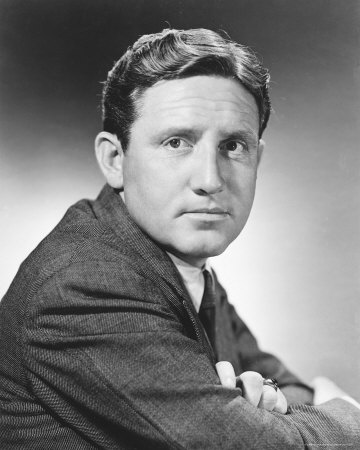Spencer Tracy (1900–1967) was an American actor renowned for his versatile and captivating performances in film. Over his prolific career, Tracy received numerous accolades, including two Academy Awards for Best Actor. His filmography includes iconic roles in classics such as “Captain Courageous,” “Boys Town,” and “Guess Who’s Coming to Dinner.” Known for his naturalistic acting style and ability to portray a wide range of characters, Tracy left an enduring legacy in Hollywood, earning the admiration of both audiences and peers.
Raised in a working-class Irish Catholic family, Tracy’s early life was marked by a modest upbringing. He discovered his passion for acting during his time at Ripon College, where he became involved in theater productions. Tracy’s early experiences in stock theater and touring companies laid the foundation for his future career in acting.
Tracy’s journey to stardom wasn’t instantaneous. After a brief stint in New York, he moved to Hollywood in the early 1930s, signing a contract with Fox Film Corporation. His initial roles were in supporting parts, and it wasn’t until he starred in John Ford’s “Up the River” (1930) that he began to gain attention. It was also during the filming of this movie that Tracy developed a lifelong friendship with fellow actor Humphrey Bogart.
Tracy’s breakthrough came when he signed with MGM in 1935. Under the guidance of Louis B. Mayer, Tracy’s career began to soar. His first major success was “The Murder Man” (1935), followed by acclaimed performances in “Fury” (1936) and “Libeled Lady” (1936). His naturalistic acting style and ability to convey depth and emotion made him a standout performer in an era dominated by larger-than-life personalities.
In 1936, Spencer Tracy starred alongside Katharine Hepburn in “Woman of the Year,” marking the beginning of one of Hollywood’s most enduring partnerships. The film’s success led to a personal and professional relationship that spanned nine films and 25 years. Despite Tracy being married to another woman, the pair’s undeniable chemistry became a defining element of their on-screen collaborations.
Throughout the late 1930s and 1940s, Tracy’s career reached new heights. He received his first Academy Award for Best Actor for his role in “Captains Courageous” (1937), portraying a Portuguese fisherman who takes in a spoiled rich boy played by Freddie Bartholomew. The film showcased Tracy’s ability to convey warmth, humanity, and authenticity in his performances.
Tracy continued to deliver memorable performances in a string of successful films, including “Boys Town” (1938), where he portrayed Father Flanagan, the real-life founder of a home for wayward boys. This role earned him his second Academy Award and solidified his reputation as a versatile actor capable of tackling a range of characters.
In the 1940s, Tracy starred in the classic film “Dr. Jekyll and Mr. Hyde” (1941), showcasing his talent for playing complex and multifaceted characters. He also received critical acclaim for his role in “The Philadelphia Story” (1940), sharing the screen once again with Hepburn and Cary Grant.
Tracy’s career faced a brief setback in the mid-1940s when he experienced health issues, including alcohol-related problems. However, he rebounded with a triumphant return in “Edward, My Son” (1949), earning another Academy Award nomination for his performance as a manipulative father.
The 1950s brought further success for Tracy, with memorable roles in films like “Father’s Little Dividend” (1951) and “Pat and Mike” (1952), where he once again starred alongside Katharine Hepburn. He received yet another Academy Award for Best Actor for his role in “The Actor” (1952), portraying an alcoholic actor confronting his personal demons.
Tracy’s career continued to flourish in the 1950s and 1960s, with acclaimed performances in “Bad Day at Black Rock” (1955) and “The Old Man and the Sea” (1958). His ability to convey moral integrity and inner turmoil resonated with audiences and critics alike. In “Judgment at Nuremberg” (1961), Tracy delivered a powerful performance as Chief Judge Dan Haywood, exploring the complexities of justice in the aftermath of World War II.
Despite his professional success, Tracy faced personal challenges, including ongoing struggles with alcoholism. His personal life was marked by a complex relationship with his wife, Louise Treadwell, and their two children, one of whom had special needs. Tracy’s commitment to his family was evident, and his personal challenges added a layer of depth to his public persona.
In 1967, Spencer Tracy’s health began to deteriorate rapidly. He completed his final film, “Guess Who’s Coming to Dinner” (1967), alongside Hepburn and Sidney Poitier. The film, which addressed interracial marriage, was a critical and commercial success. Tracy’s poignant performance earned him a posthumous Academy Award nomination.
Tracy passed away on June 10, 1967, just days after completing “Guess Who’s Coming to Dinner.” His death marked the end of an era, and Hollywood mourned the loss of one of its greatest actors. Tracy’s impact on the film industry was immortalized through his timeless performances and his ability to embody characters with authenticity and emotional depth.
Spencer Tracy’s legacy continues to resonate, influencing generations of actors who admire his craft. His unique ability to convey a sense of honesty and truthfulness on screen set him apart in an industry often associated with larger-than-life personas. Tracy’s enduring appeal lies not only in the characters he portrayed but in the genuine humanity he brought to each role, leaving an indelible mark on the art of acting.










